NYC’s Forgotten ‘War on Christmas Trees’
Discover how an obscure holiday crackdown affects festive street vendors today!


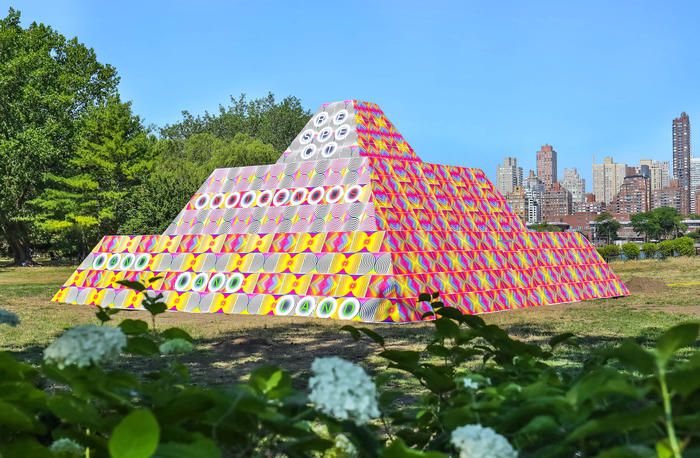
Jeffery Gibson; ‘Because Once You Enter My House It Becomes Our House; 2020; Courtesy the Artist; Socrates Sculpture Park; Sikkema Jenkins & Co., New York; Kavi Gupta, Chicago; Roberts Projects, Los Angeles; Image by Scott Lynch.
As New York City continues to reopen in the wake of the COVID-19 pandemic, it is once again safe and possible to explore the city’s beautiful public spaces. Luckily, there are many new public art installations on display this month that you can safely view outside or in a space where you can keep a safe distance away from others. We’ve brought back our roundup so you can discover them all! These installations are spread throughout the five boroughs and touch on a number of prevalent contemporary topics such as the importance of essential workers, the Black Lives Matter Movement, and the history of voting in the United States.
Without further ado, here are the public art installations on display in New York City this August:
A massive new piece, named Because Once You Enter My House, It Becomes Our House, is now on display at Socrates Sculpture Garden in Queens. The vibrantly colored sculpture was created Jeffery Gibson, recipient of the 2019 MacArthur Foundation “Genius Grant.” It is meant to serve as a monument to inclusion and diversity.
Because Once You Enter My House, It Becomes Our House draws inspiration from and pays visual homage to Indigenous North American peoples, pre-Columbian Mississippian architecture, and to modern-day queer camp aesthetics. The multi-tiered structure is a reference to the architecture of the ancient city of Cahokia, the largest city of the North American Indigenous Mississippi people. In addition to the sculpture, Gibson and the Socrates Sculpture Garden have curated a series of Indigenous led performances that will take at the park in the coming months.
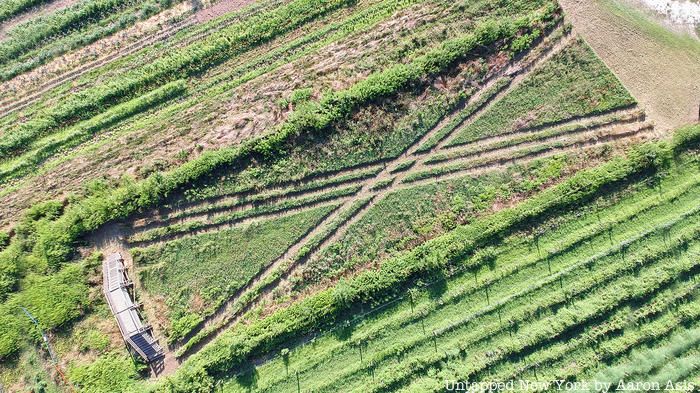
When the Queens Country Farm reopens on August 2nd, a temporary site-specific public art installation by artist Aaron Asis will be on display on its grounds. Cover Crop is designed to celebrate the farm’s transitional landscape. The installation features a set of crisscrossing paths that cut through a half acre patch of farmland planted with sweet peas, buckwheat, and rye. Asis sites Queens County Farm’s Amazing Maize Maze as a source of inspiration for this new project. The work is meant to inspire discussion on the nature of dormant agriculture, vegetation life cycles, and sustainable farming practices.
The installation is imbued with new meaning by the ongoing pandemic. “As the challenges associated with personal isolation and public health continue to identify our new normal, it is more important than ever before to create new ways to stay connected and to share new experiences,” says Cover Crop artist Aaron Asis. “The arts have always been the great equalizer when it comes to connecting people.” It will be on view through Sunday, August 9th. Untapped New York Insiders can get a sneak peek of the installation on Friday, July 31st at 12PM EST on a virtual tour of the Queens County Farm!
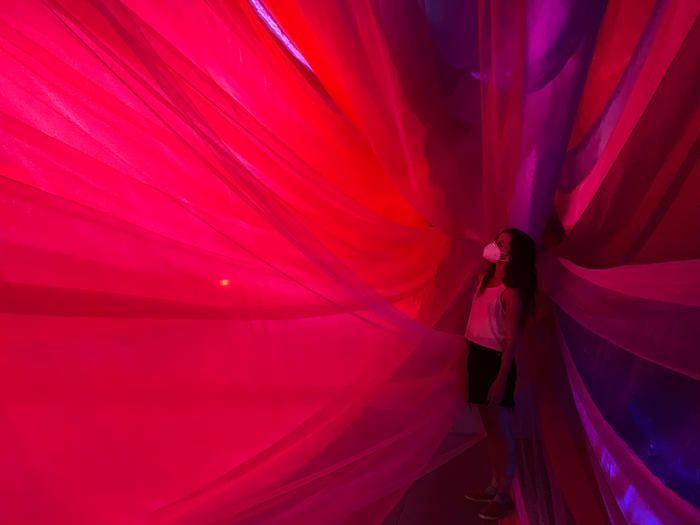 Photo by Sara Jimenez
Photo by Sara Jimenez
A Setting is a new piece of visual art currently on display for the public at FiveMyles in the Crown Heights neighborhood of Brooklyn. The piece represents the collaboration of Brooklyn-based artist Sara Jimenez and the writer and political activist Jason Schwartz. A Setting is meant to echo the imagery of a setting sun by using red textiles to create horizontal bars that extend from wall to wall.
A Setting occupies a full room of the FiveMyles performance and exhibition space where visitors can become immersed in a sensory experience of New York’s contemporary moment as they walk through the enveloping fabric. The piece can also be viewed from outside. Sunset has taken on a new meaning as of late, as it marks the end of another day during the pandemic and the racial turmoil in New York City and around the country. The colors of the textiles are meant to evoke the sense of pause, grief, reflection, and care that arrive with the day’s end during 2020. The installation will run until August 30.
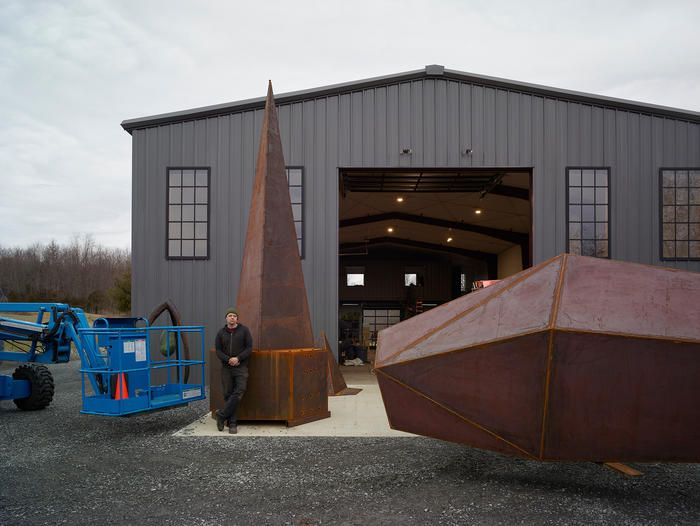
Kris Perry stands with pieces of Mother Earth outside of his studio. Photo by Daniel McCabe.
On August 12, a new, 35-foot-tall steel sculpture named Mother Earth will be unveiled at Rockaway Beach in Queens. The installation is the brainchild of artist Kris Perry. It is a part of NYC Parks’ Art in the Parks, a program that brings both experimental and traditional pieces of artwork to public locations throughout the five boroughs.
The towering statue is made of Corten steel, a material that is meant to evolve and change with the seasons and the site. Mother Earth will be located at the Beach 98th Street entrance to Rockaway beach, two blocks away from the A Train. Rockaway Beach is also serviced by the NYC Ferry.
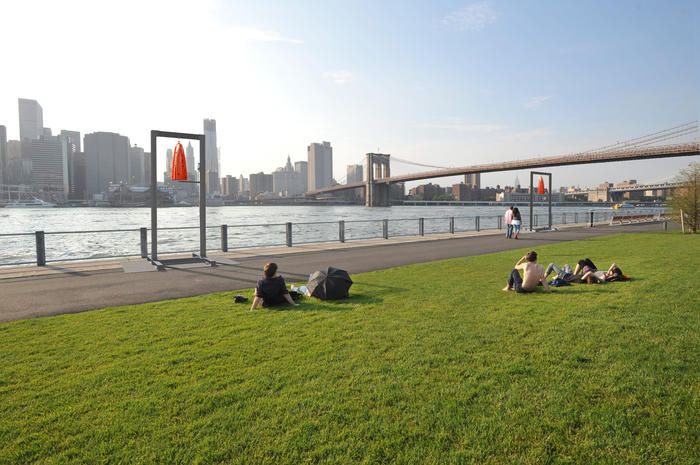
Concept rendering of detail from Davina Semo: Reverberation, to be on view at Brooklyn Bridge Park Pier 1, Aug 13 – April 18, 2020. Courtesy of Public Art Fund, NY.
A new piece by sculptor Davina Semo will be on display along the waterfront in Brooklyn Bridge Park starting on August 13th. The large-scale installation, named Reverberation, is made up of interactive bells and is meant to evoke public modes of communication that harken back to New York City’s maritime history. Located adjacent to the Brooklyn Bridge, the piece explores our relationship to industrial material and the built environment. And yes, park visitors can ring the bells!
The installation is supported by the Public Art Fund and was curated by Daniel S. Palmer. The Public Art Fund uses contributions from individuals, corporations, and private foundations to support works of art throughout the five boroughs, including the artwork at LaGuardia Airport’s new Terminal B.
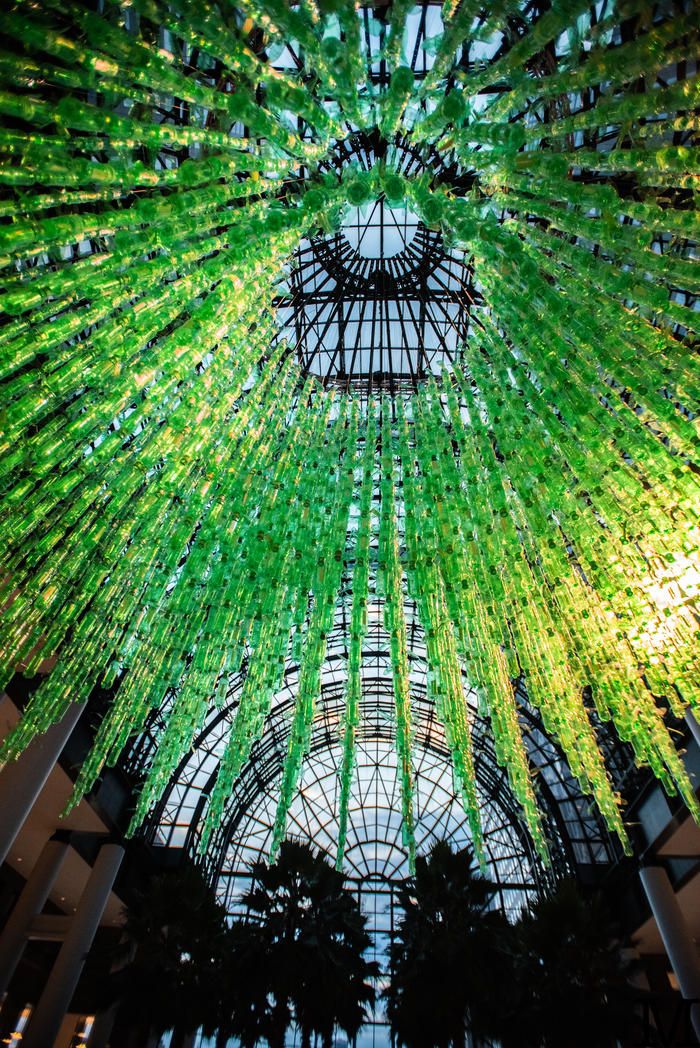
Photo by Ryan Muir, courtesy of Brookfield Place.
A new piece of vinyl artwork named Floating MAiZE is currently on display at the Winter Garden in Brookfield Place. The installation is the latest piece from the innovative artist Jean Shin. Shin is known for transforming cast-off materials into elegant expressions of place and identity. Floating MAiZE fits the bill in this regard by using recycled vinyl to comment on sustainability in everyday practices as well as within the global ecosystems.
Floating MAiZE engages audiences in a conversation about plastic waste, dietary choices, and environmental stewardship. The installation consists of recycled plastic bottles suspended above the grand staircase in the Winter Garden. The material is arranged to look like an elevated cornfield (hence the name Floating MAiZE) and gives viewers the experience of traveling to an artificial landscape. Shin’s piece is part of the River To River 2020: Four Voices festival.
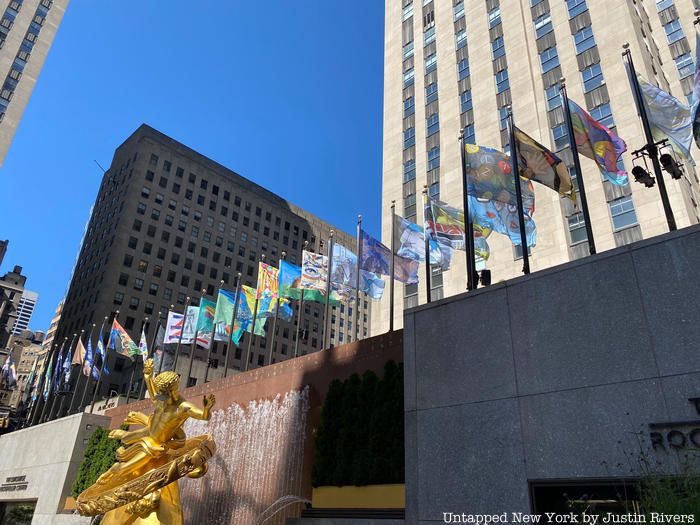
All 193 flags that surround the iconic ice rink at Rockefeller Center have been redesigned by renowned artists and everyday New Yorkers to show love for the city. The Flag Project celebrates the love that people from all over the world, not just New Yorkers, have for the Big Apple. Flag designs were crowdsourced and generated over a thousand submissions.
The winning designs were produced into an 8-foot by 5-foot flags that ring the rink. Contributing artists include Jeff Koons, Christan Siriano, Carmen Herrera, and Shantell Martin among many others. The designs are as colorful and diverse as the people of New York City. Some play off of familiar New York images like red and white plastic “Thank You” shopping bags or a MetroCard, while others are original artistic creations. You’ll even spot some puns like “New York Makes Heroes” (featuring the image of a hero sandwich). The flags will be on display through Agust 16th, 2020.
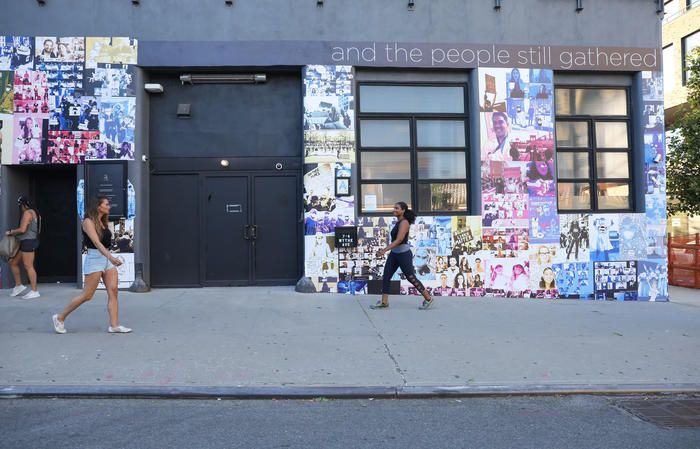 Photo Courtesy of 74 Wythe.
Photo Courtesy of 74 Wythe.
74 Wythe, a newly opened multi-level event space in Williamsburg, recently unrelieved a large-scale art installation in tribute to the Black Lives Matter movement and the inspiring people fighting the COVID-19 pandemic. The installation, named #74wythefamilarfaces, is a collage of portraits based on recent photographs and events. The piece wraps around the 15,000-square-foot exterior of the building and can be viewed outside while maintaining a safe social distance.
The installation was conceived and directed by Angela Redai of Artine Advisory in partnership with the illustrator Arianna Margulis. The artwork is one of the multiple ways in which 74 Wythe (which was slated to open this summer) is trying to give back to the Brooklyn community. The event space is donating one percent of all profits to various charities such as Black Lives Matter, the Brooklyn Comunity Foundation, and the Stonewall community foundation, and is offering meeting space free of charge to local groups involved in organizing the Black Lives Matter movement.
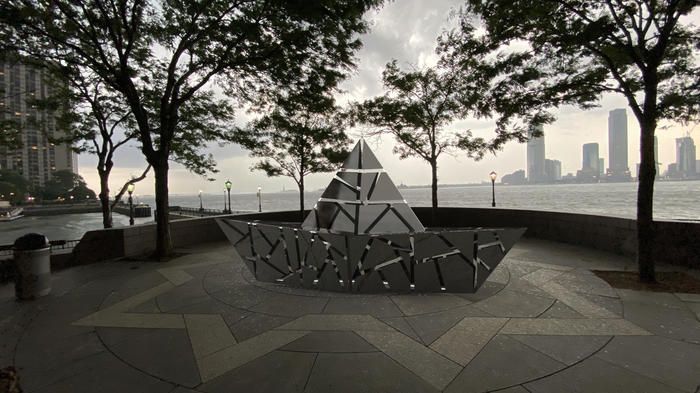
Artist rendering of Muna Malik’s Blessing of The Boats: River To River in Belvedere Plaza, Battery Park City, produced by the Lower Manhattan Cultural Council (LMCC) and co-presented with the Battery Park City Authority as part of River To River 2020: Four Voices, courtesy of the artist
Blessing of The Boats at Belvedere Plaza in Battery Park City is another piece of the River To River 2020: Four Voices festival. Co-presented with Battery Park City Authority, this event and art installation invites New Yorkers to directly engage with and contribute to the installation. Participants are encouraged to fold a piece of paper into an origami boat and on it, write your answer to the prompt, “We have an opportunity to set sail towards a new future. What society would you build and how do we get there?”
You can see an instructional video online to learn how to fold the boat. Bring your boat to Belvedere Plaza between August 15th and August 18th to add it to the installation created by Muna Malik. Malik’s piece will create a quiet and meaningful place to commit to the rebuilding of a more just, equitable, and sustainable future.
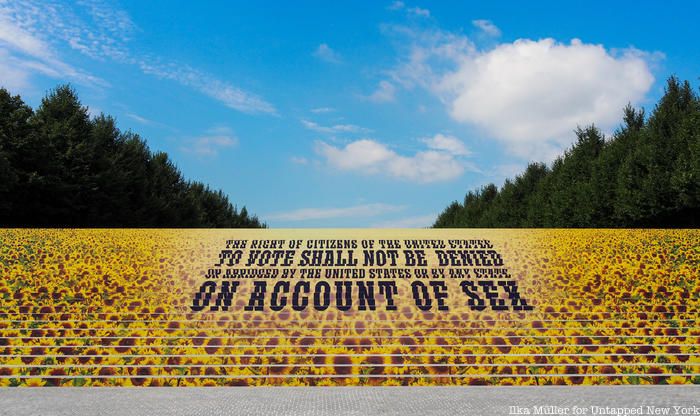
Late last month, FDR Four Freedoms Park on Roosevelt Island, in partnership with the New-York Historical Society and the League of Women Voters, unveiled a field of sunflowers on the steps of the park. The installation honors the 100th anniversary of the ratification of the 19th amendment.
The sunflower is a historic symbol of the American Women’s Suffrage Movement, making the display an appropriate celebration for the centennial of the amendment which granted women the right to vote. Planners of the installation hope that it will spark conversations about the importance of voting rights during a pivotal election year. The twelve-foot by one-hundred-foot tromp l’oeil will be on display at the park until August 20th.
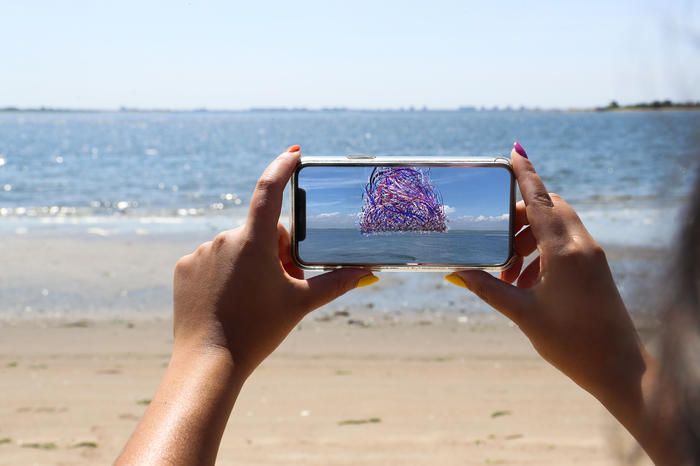
Photo by Neil Rasmus/BFA, courtesy of Art Production Fund.
A new public art project utilizing augmented reality is currently on display at Shirley Chisholm Park in the Rockaway neighborhood of Queens. The piece, named Liberty Bell, is the work of artist Nancy Baker Cahill. The Rockaway piece is one of six Liberty Bell experiences available throughout the country this summer. Liberty Bell uses its unique technological premise to comment on the tumultuous nature of American history and the nation’s current state of inequality and injustice.
Taking visual inspiration from the historic Liberty Bell in Pennsylvania and its famous crack, Cahill’s piece features richly textured brushstrokes and bell sounds that grow more and more turbulent the longer they are viewed. The visuals and audio are meant to reflect the evolution and transformation of liberty over time and the complex reality of America today. The art is experienced through augmented reality technology viewed using the free 4th Wall app. The piece was commissioned by the Art Production Fund, in partnership with 7G Foundation and the Jamaica Bay-Rockaway Parks Conservancy.
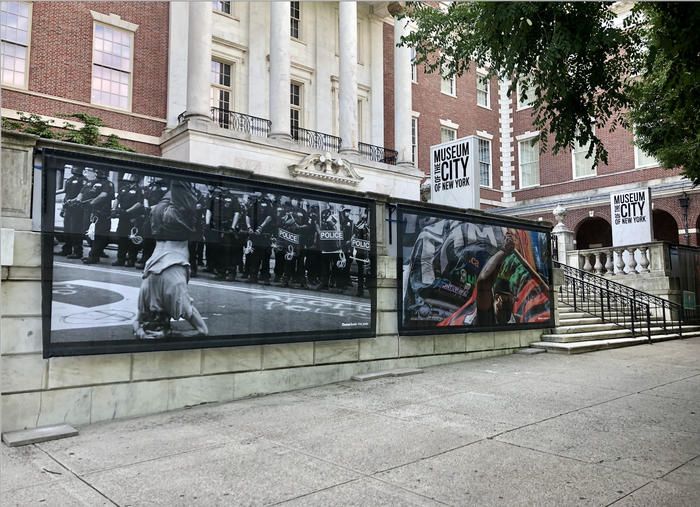 Courtesy of Museum of the City of New York
Courtesy of Museum of the City of New York
On August 1, the Museum of the City of New York will unveil its first outdoor exhibition, New York Responds. The photographic exhibit features images that document the coronavirus pandemic as a singular and monumental event in the city’s history. The powerful images also capture New York’s response to police violence. More than 15,000 images were submitted to the Museum’s open calls for stories and photographs.
Using the hashtags #CovidStoriesNYC and #ActivistNY, New Yorkers made history in real-time. Submissions are reviewed by the museum’s curatorial team on a rolling basis and may be featured on the museum’s social media feed and/or included in the exhibition. New York Responds is the first in a planned series of exhibitions at the museum this year meant to tell the story of 2020 as it unfolds. The public can view New York Responds on the exterior walls and entrances of the Museum of the City of New York.
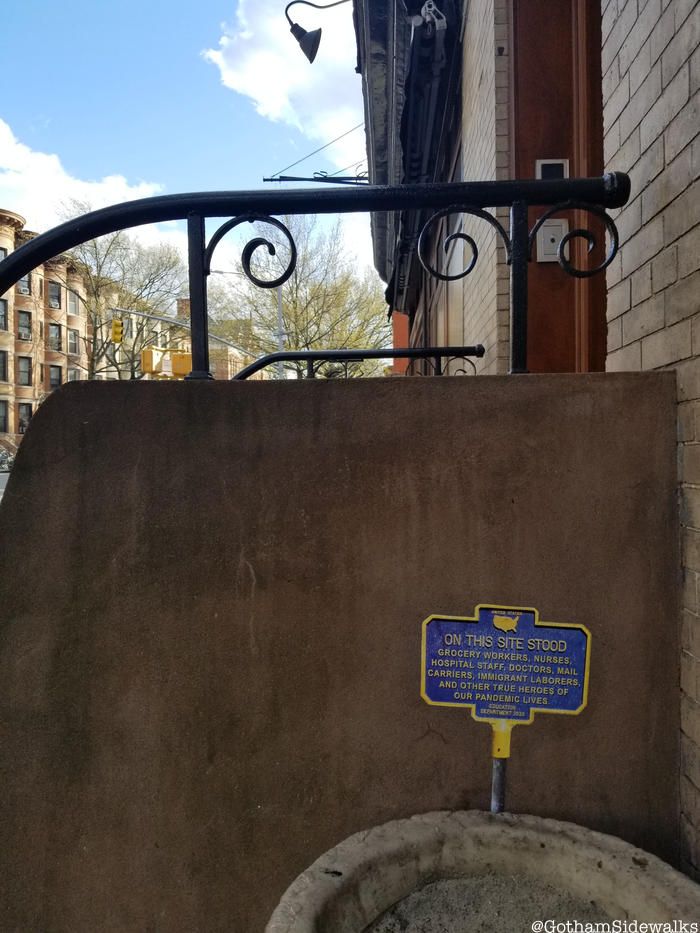
Photo by Rich Garr, tour guide for Gotham Sidewalks.
While there are many official tributes to healthcare workers throughout New York City, one of the most endearing was created by the community. Outside of Brooklyn Methodist Hospital in Park Slope, you can now find a faux-plaque designed in the style of the blue and yellow historical markers that dot the city.
The piece is the work of local artist Norm Magnusson and is a tribute to the efforts of essential workers during the COVID-19 pandemic. The sign reads, “ON THIS SITE STOOD GROCERY WORKERS, NURSES, HOSPITAL STAFF, DOCTORS, MAIL CARRIERS, IMMIGRANT LABORERS, AND OTHER TRUE HEROES OF OUR PANDEMIC LIVES.”
 Black Lives Matter mural in Lower Manhattan
Black Lives Matter mural in Lower Manhattan
The Black Lives Matter movement has been driving the national conversation on racial justice and has left its mark throughout New York City. In recent months, eight Black Lives Matter murals have been created throughout New York City, with at least one mural in each of the five boroughs. The latest mural to be painted, with the help of Mayor DeBlasio, is on Jamaica Avenue near 150th Street in Queens.
In Manhattan, three murals can be found, one in lower Manhattan near Foley Square, another in Harlem on Adam Clayton Powell Jr. Boulevard, and the last in Midtown directly in front of Trump Tower. Brooklyn has two murals, one on Joralemon Street and another on Fulton Street. The mural the Bronx is on Morris Avenue and the mural in Staten Island is on Richmond Terrace near the Staten Island Ferry.
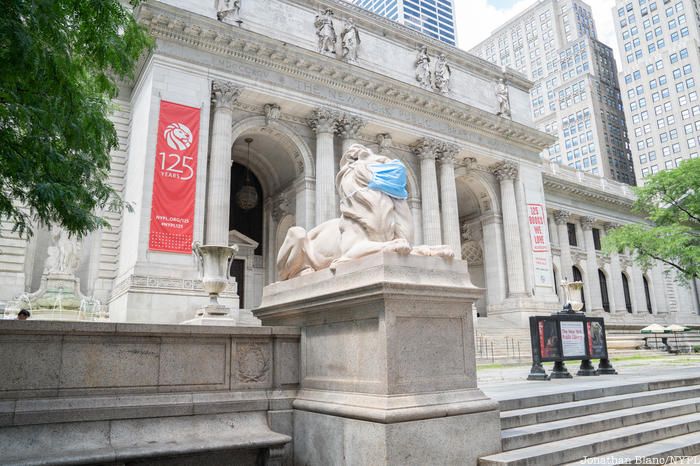
The two famous lions that stand guard in front of the New York Public Library (named Fortitude and Patience) have joined in the city’s pandemic fighting efforts. Each of the lions has been fitted a large mask to remind passerby on Fifth Avenue to do the same. The lion-sized masks are a staggering three feet wide and two feet tall, making sure to fully cover the mouths and noses of the stone creatures.
The gigantic masks are yet another event in what has been a momentous year for Patience and Fortitude. The two lions were restored last November, celebrated their 109th birthday in May, and were given oversized versions of some of the library’s most popular books to read in February. In other exciting news, the New York Public Library has reopened some of its branches for grab-and-go service. Like the lions outside though, masks will be mandatory.
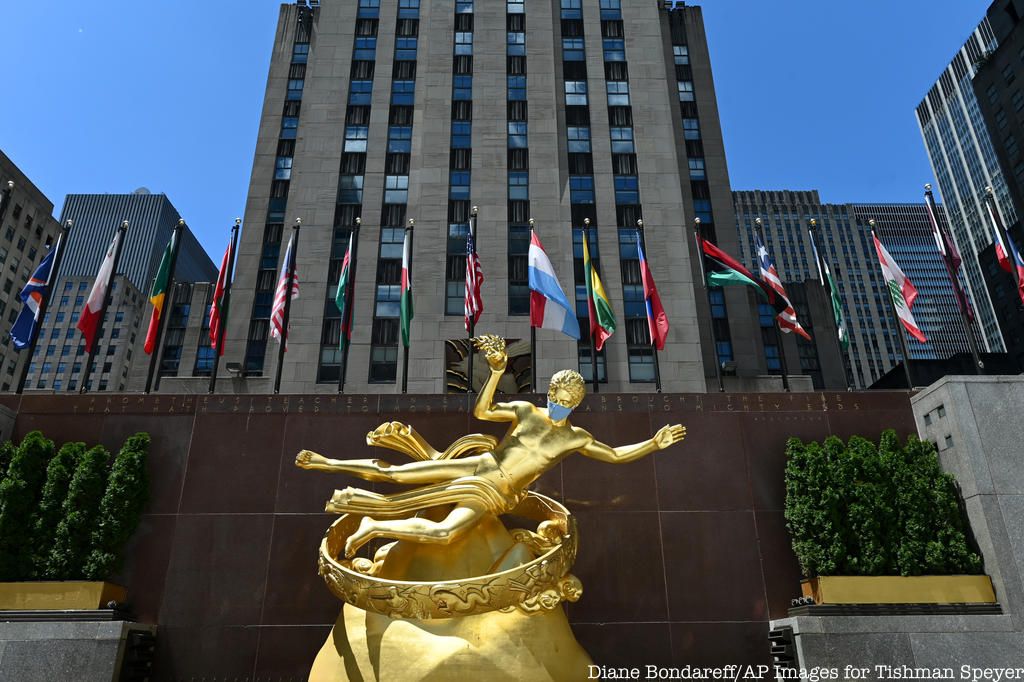
Photo by Diane Bondareff/AP Images for Tishman Speyer.
Not to be outdone by the New York Public Library’s famous lions, the statues at Rockefeller Center have also been fitted with masks. Statues like the iconic “Atlas” and his globe, the “Mankind Figures” (Maiden and Youth), and the golden “Prometheus” watching over the ice skating rink are all staying safe and wearing masks. Organized by the real estate investment firm Tishman Speyer as part of the Association for a Better New York (ABNY), the initiative is meant to remind New Yorkers to wear their own masks and observe social distancing.
Rockefeller Center has been the site of several initiatives since the pandemic began, including the installation of a giant “New York Tough” logo on the ice rink in April and 30 Rock lighting up in blue for essential workers.
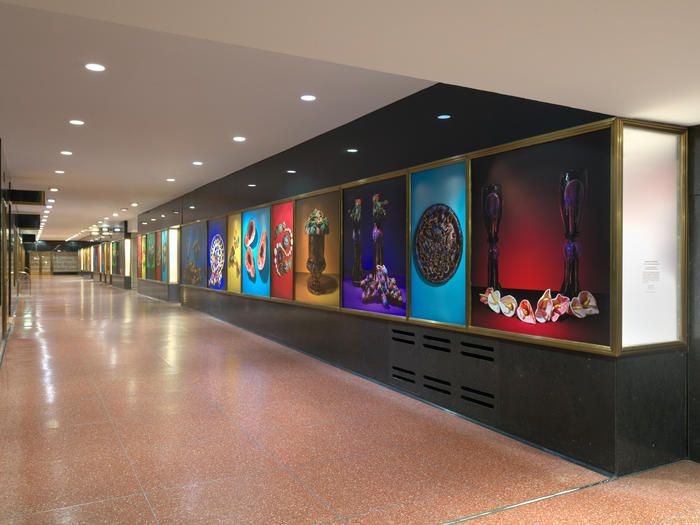
Photo by Dan Bradica, courtesy of Art Production Fund.
The work of Brooklyn-based artist Ryan Flores will be showcased all summer long at Rockefeller Center in a new exhibition entitled Low Life’s: An Upside Down Love Letter. Flores works primarily in the medium of ceramics and uses vibrant colors to attract viewers and play with their expectations. The Low Life’s exhibition will feature three of Flores’ ceramic installations inside of the glass display cases of 45 Rockefeller Center.
Additionally, other examples of Flores’ art will be displayed as large-scale images throughout the Rockefeller Plaza concourse. The exhibition is part of Rockefeller Center’s ongoing Art In Focus series and is produced in partnership with the Art Production Fund.
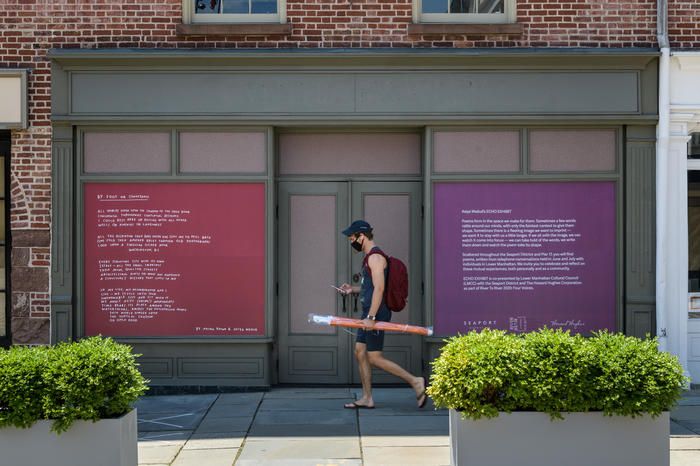
Photo by Ian Douglas.
Scattered throughout the Seaport District and Pier 17, you can now find a series of poems written based on telephone conversations held by individuals in Lower Manhattan during the months June and July. The display of the poems was designed by Shannon Finnegan. The poems, which together are named Echo Exhibit, are meant to serve as lasting evidence of the conversation between strangers during the quarantine, capturing the unique qualities and emotions of the situation.
Echo Exhibit is a part of the Lower Manhattan Cultural Council’s (LMCC) summer festival, an event created in the aftermath of 9/11 to help heal and celebrate the area’s resiliency through the power of art. The festival continues to celebrate resiliency this year as the exhibits are all imbued with the context and meaning of the COVID-19 pandemic.
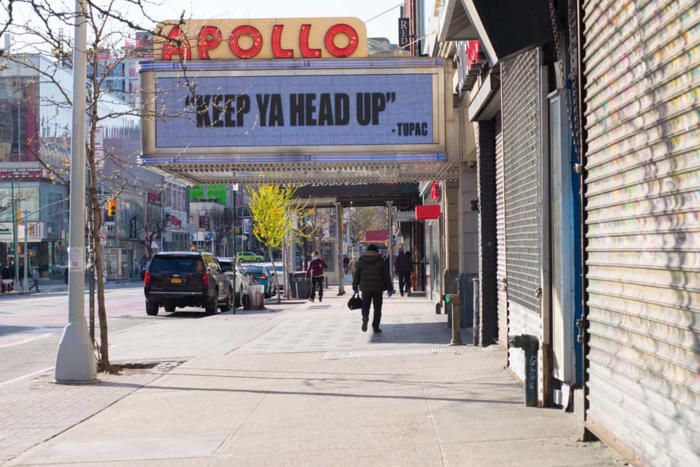
Photo by Kay Hickman.
Starting on August 14, Hope Wanted: New York City Under Quarantine will be on display, free of charge in the rear courtyard of the New-York Historical Society. The new exhibit was curated by poet and journalist Kevin Powell and photographer Kay Hickman. More than fifty photographs and fourteen audio interviews from the initial weeks of the pandemic are featured. Hickman’s photographs feature people and locations throughout the city and the audio interviews document the initial responses of New Yorkers as the virus began to shut down the city.
The outdoor setting of the exhibit provides an open-air environment where visitors can view the art while maintaining a safe social distance. Admission is free, but entry will be limited and face coverings are required for entry. The exhibition will also include a quiet seating area surrounded by plants that will be conducive to reflection.
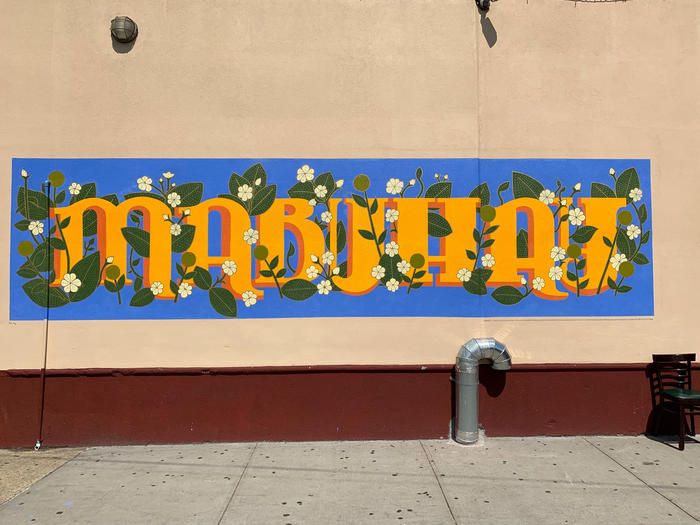
Little Manila Queens Bayanihan Arts, Courtesy The Laundromat Project.
In the Woodside neighborhood of Queens (also known as Little Manila), artists Xenia Diente and Jaclyn Reyes are creating a series of community art pieces to celebrate the area’s Filipino Community. The brightly colored mural on the side of Amazing Grace Restaurant and Bakery, at the corner of 69th Street and Roosevelt Avenue, says “Mabuhay.” This Filipino expression can mean “welcome,” “cheers” or “may you live.”
The two artists are working with Filipino-American residents, local businesses, the Laundromat Project, and other organizations in the neighborhood to create colorful and celebratory murals. Over half of New York City’s Filipino community lives in the borough of Queens. The new mural on Roosevelt Avenue is meant to celebrate the richness of the Filipino experience in Queens and aims to put Little Manila in dialogue with nearby immigrant communities from South Asia, Southeast Asia, and Latin America.
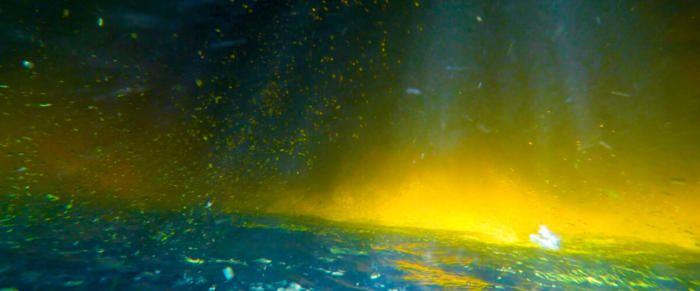
Courtesy of 13BC
Every night at midnight this August the screens in Times Square will be taken over by a video project from the collective 13BC. Titled When Horses Were Coconuts, the project considers the ongoing legacy of the atomic bomb and the inextricable histories of warfare, mass-media spectacle, pollution, and public memory. It was inspired by actual footage of a bomb test from 1951 and the sound that accompanied it.
When CBS News captured film footage of an atomic bomb test in Frenchman Flat, Nevada, they didn’t capture adequate sound. Foley artist Robert L. Mott had to fabricate the noise from the bomb. He sourced an audio recording of a waterfall from the CBS sound library and remixed it backward and slowed down. When Horses Were Coconuts reimagines those sights and sounds. The underwater footage seen was filmed with an underwater handheld camera, swimming towards a waterfall in an upstate tributary of the Hudson River. By flipping the river’s surface upside down, the artists have created an otherworldly effect that conflates the ecological and social consequences of weapons testing. When Horses Were Coconuts is part of a larger project titled Fatal Act, originally presented at 80WSE in 2019, consisting of four video works that together plumb the history of nuclear warfare.
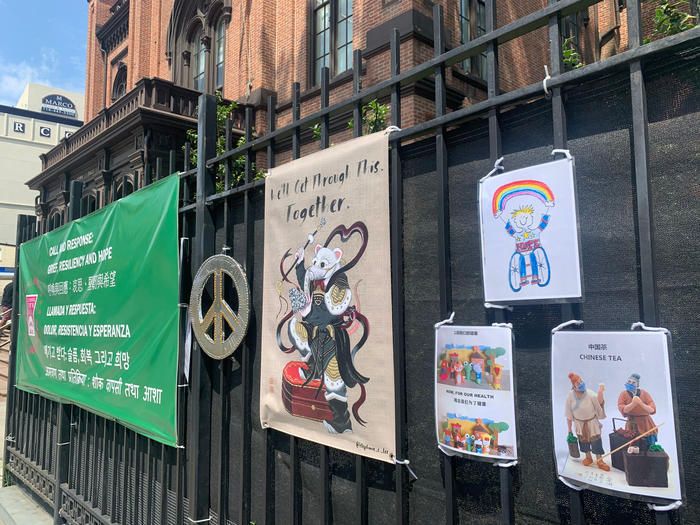
Courtesy of Flushing Town Hall
Flushing Town Hall is currently taking the term “public art” very literally with its new Call and Response: Grief, Resiliency and Hope exhibit. Functioning as an ongoing dialogue, the installation is asking anyone to create their own pieces of art to display on the fences outside of the building, so long as it matches the general themes stated in the title. In the wake of the coronavirus pandemic and the larger fight for racial justice, the exhibit aims to have the community reflect on these events together.
The families, professional artists, and amateurs are all invited to create artistic expressions of grief, resiliency, and hope to share in the exhibit. To help aid in the creative process, free art kits will be available for pick up on-site at Flushing Town Hall from 10 am to 3 pm on August 11 through August 13. Details about submissions are available on the Flushing Town Hall website.
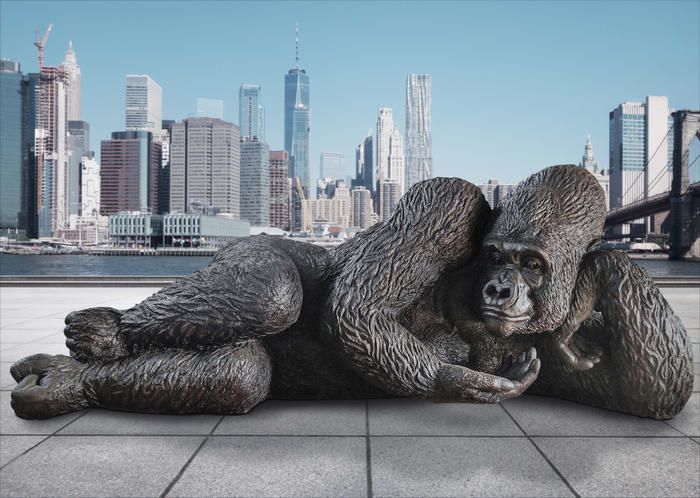
Rendering Courtesy of the artists, Gillie and Marc Schattner
The largest bronze gorilla statue in the world is making its way to New York City this month. On August 24, King Nyani will be on display at Bella Abzug Park at Hudson Yards. Inspired by the famous film King Kong, the statue is designed to raise awareness about the endangered mountain gorilla species and to change the narrative about the animals from one of violence (as depicted in the movie) to one of compassion. Instead of terrorizing New York City atop the Empire State Building, this gorilla will be giving out free hugs to any willing New Yorkers.
The giant bronze statue is the work of world-renowned public artists Gillie and Marc Schattner. Working alongside the Dian Fossey Gorilla Fund and the WWF, the artists strived to create both a realistic and poignant depiction of a gorilla. The couple even went on a special trip to Uganda where they were able to see a family of mountain gorillas in the wild. Struck by the empathy and kindness on display in the gorilla family, the artists made it their goal to bring this same message of empathy to the art they were creating.
Keep reading to discover what public art installations are still on view from previous months!
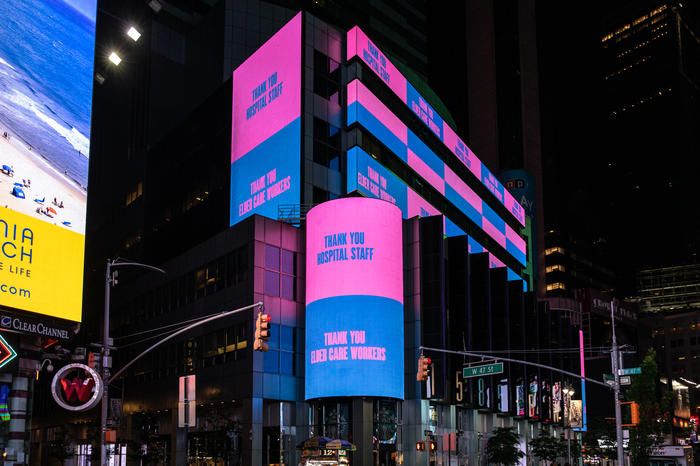
Photograph Courtesy of Maria Baranova
Since April, Poster House and Times Square Arts have partnered on an ongoing series of PSAs displayed throughout 1,800 screens in New York City. Powered by LinkNYC and Times Square Alliance in partnership with For Freedoms and Print Magazine, the city-wide public art project displays messages related to COVID-19 intended to spread New York pride and gratitude for frontline workers.
The messages are featured on 1,774 LinkNYC kiosks and Silvercast billboards like the one above the Lincoln Tunnel. The colorful designs were created by a variety of artists including Milton Glaser, Jessica Hische, Joe Hollier and many more.
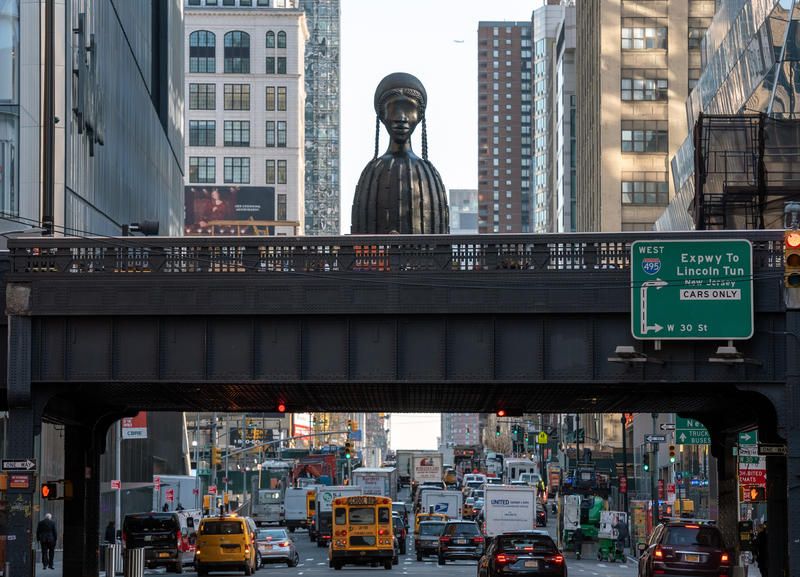
Simone Leigh, Brick House, 2019. A High Line Plinth commission. On view June 2019 – September 2020. Photo by Timothy Schenck. Courtesy the High Line
For about two months, Simone Leigh’s Brick House has been admired from afar as it loomed over 10th avenue. This month, visitors can get an up close look at the giant sculpture when the Spur, the newest section of the High Line opened on June 5th. It is the first sculpture to be displayed in the new space, which will host a series of rotating exhibits.
Brick House, a sixteen-foot-tall bronze bust of a black woman. Her head is adorned with an afro and cornrow braids along her hairline. The figure sits atop the Plinth, a new exhibition space at on the plaza of the Spur. Brick House is the first work in the series Anatomy of Architecture by Simone Leigh. The series of sculptures will intermingle architectural forms from West Africa to the American South with the human body. Brick House will be up until September 2020.
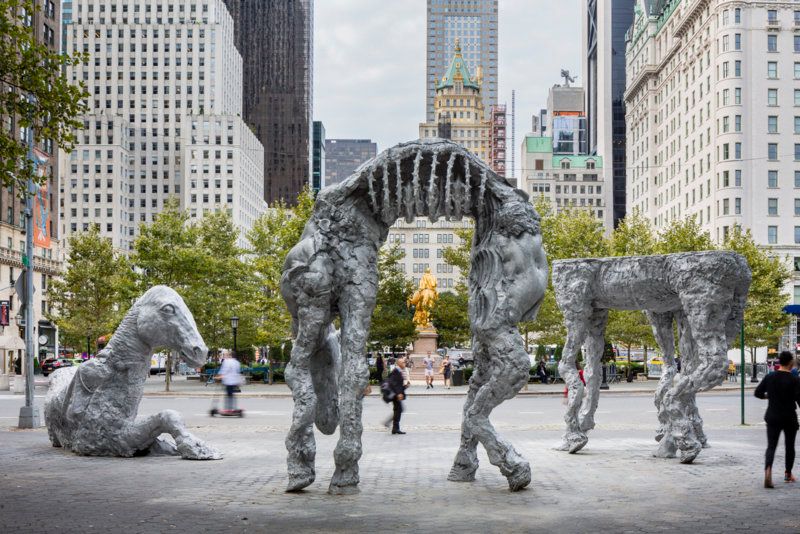
Photo: Nicholas Knight, Courtesy of Public Art Fund, NY
Public Art Fund returns with another striking installation at the entrance to Central Park. On September 11th, three whimsical aluminum equine sculptures will be on display by French artist Jean-Marie Appriou. The works, ranging in size from 16 feet tall to 16 feet long, will be inspired by the site and the history of horses here, including the gold leaf statue of William Tecumseh Sherman just across the way and the horse-drawn carriages that still ply the park and pick up at this entrance.
“Jean-Marie Appriou’s unconventional approach to sculpture is almost alchemical,” says Public Art Fund Associate Curator Daniel S. Palmer. “His craftsmanship is informed by a deep knowledge of the historical lineage of sculptors that have preceded him. At the same time, Appriou’s equine sculptures are otherworldly, evoking the silent majesty of horses with nuanced sculptural details that flicker between narrative and poetry.” The horse sculptures will be on display through August 2020.

The gender balance between male and female statues in New York City is little more even now thanks to a large scale sculpture installation. Created by the husband-and-wife team of the award-winning public artists Gillie and Marc, Statues for Equality aims to remedy the fact that less than 3% of statues in New York City are dedicated to females by creating ten larger than life-sized bronze sculptures of famous women from astronaut Tracy Dyson to actress Nicole Kidman. The new statues honor the important contributions women have made to society and they make their debut today, on Women’s Equality Day 2019.
The subjects of the statues were chosen by a public vote. Each woman is standing atop a blooming flower of her choosing which represents her personality, beyond her technical and social accomplishments. With the addition of these ten figures, the percentage of female statues in the city rises to 9%. Funds are currently being raised to add another statue of Justice Ruth Bader Ginsberg in Brooklyn. The original round of statues will be on display until August 2020.
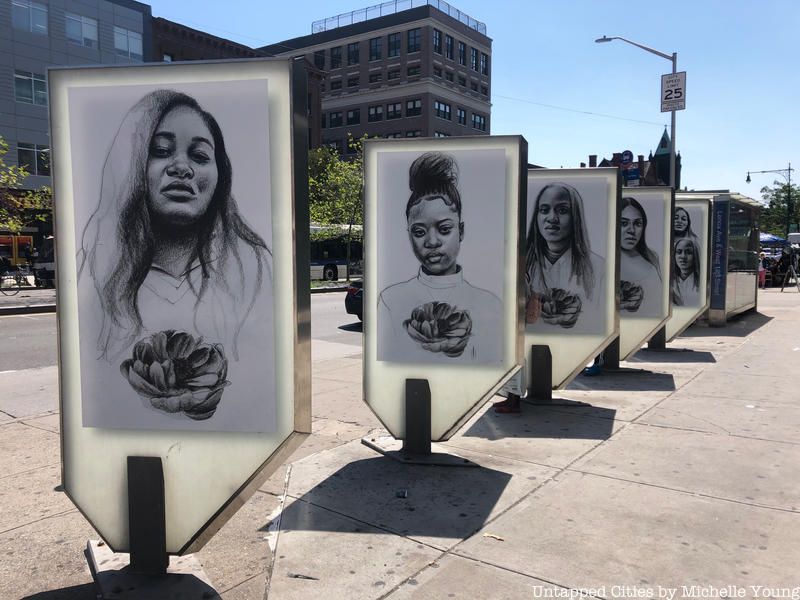
A series of display cases on Lenox Avenue and 125th Street in Harlem contain an exhibition by Brooklyn artist Tatyana Fazlalizadeh, a Black/Iranian visual artist who is the New York City Commission on Human Rights’ Public Artist in Residence. The series, Stop Telling Women to Smile, is a continuation of a movement started by the artist in 2012 that can be found on walls all across the world. Her artist residency here in New York City aims to “present the experiences of anti-black racism and sexual harassment experienced by New Yorkers through public art.”
Stop Telling Women to Smile showcases portraits of women on each display case, with captions on the back that speak directly to street harassment offenders. One of the cases shows actual written responses on postcards Fazlalizadeh placed in locations around the city, with questions like “What assumptions to people make about you because you are black?” and “What do you want to say back to your harassers on the street?” As Fazlalizadeh writes on the website about the project, “Street harassment is a serious issue that affects women worldwide.
This project takes women’s voices, and faces, and puts them in the street – creating a bold presence for women in an environment where they are so often made to feel uncomfortable and unsafe.” The work will be up until at least August 2020. Fazlalizadeh also has another exhibition, Respecting Black Women and Girls in St. Albans, in Queens at the Daniel M. O’Connell Playground.
Next, check out our upcoming tours to explore more of New York City!
Subscribe to our newsletter